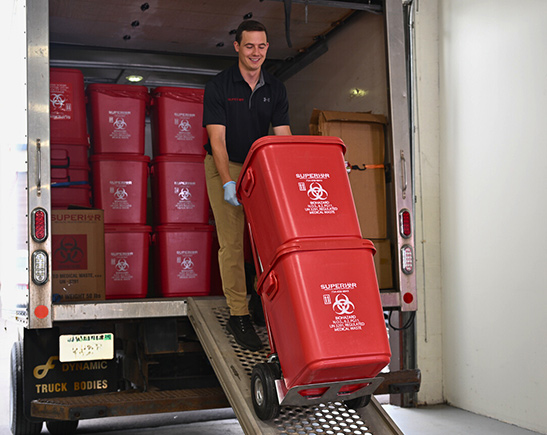Browsing Security: The Necessary Guide to Medical Waste Disposal Ideal Practices
Browsing Security: The Necessary Guide to Medical Waste Disposal Ideal Practices
Blog Article
The Significance of Proper Garbage Disposal Practices
The management of waste is a critical facet of ecological stewardship that commonly goes undetected in our lives. Proper garbage disposal techniques are not simply a matter of comfort however are vital for safeguarding our environments and public health and wellness. From the effects of incorrect garbage disposal on our environment to the long-term effects for future generations, the relevance of adopting lasting waste monitoring techniques can not be overstated. By exploring the environmental influence of reckless waste disposal, the benefits of reusing initiatives, and the importance of community interaction in waste decrease initiatives, a deeper understanding of why appropriate waste disposal practices are vital emerges.
Ecological Impact of Improper Disposal
Inappropriate disposal of waste poses a substantial hazard to the setting as a result of its destructive results on ecological communities and human wellness. When waste is not appropriately managed, it can cause air pollution of the water, dirt, and air, causing harm to different plant and pet varieties. click here. Chemicals and toxic substances from improperly disposed waste can leak into the ground, infecting groundwater resources and influencing the health of both wildlife and people
Additionally, the build-up of waste in land fills produces greenhouse gases like methane, adding to climate modification and global warming. Improper disposal methods also result in littering, which not only deteriorates the visual value of the atmosphere but can likewise hurt wildlife through consumption or complexity.
To minimize these environmental effects, it is crucial for people and neighborhoods to take on proper garbage disposal techniques such as reusing, composting, and responsible contaminated materials disposal. By taking these actions, we can help safeguard ecological communities, preserve natural sources, and safeguard human health and wellness for future and existing generations.
Benefits of Recycling Programs
Consistently participating in recycling programs provides numerous advantages for both the setting and society as a whole. Among the key advantages of recycling is the preservation of all-natural sources. By reusing products such as paper, glass, plastic, and steel, much less raw materials need to be removed from the earth, leading to decreased logging, mining, and boring tasks. This preservation of resources not just assists in preserving ecological balance however likewise contributes to sustainable development.
In addition, reusing plays a vital role in lowering power consumption and greenhouse gas emissions. The production of items from recycled materials usually needs less power contrasted to making from virgin sources - medical waste removal. Because of this, the carbon footprint associated with the manufacturing procedure is substantially decreased, aiding in the fight against environment change
In addition, recycling programs develop work opportunities in the reusing sector, advertising economic development and social well-being. By encouraging the recycling and reuse of products, these programs support a circular economy that lessens waste generation and takes full advantage of source effectiveness, ultimately causing a cleaner, greener future for generations to come.
Contaminated Materials Monitoring Standards
Implementing efficient contaminated materials management standards is critical for minimizing environmental and wellness dangers associated with the inappropriate disposal of unsafe products - click here. Appropriate handling, treatment, and disposal of contaminated materials are important to protect against contamination of dirt, water sources, and air
One trick standard is correct labeling of unsafe waste containers to guarantee risk-free handling and transportation. Furthermore, facilities should comply with rigorous storage demands to avoid leaks, spills, or crashes that might threaten human wellness and the setting. Normal training programs for employees on contaminated materials administration methods are additionally essential to make sure compliance with regulations and promote a culture of safety.
In addition, contaminated materials needs to be segregated based on its residential properties to prevent chain reactions that could result in hazardous situations. Applying a thorough waste monitoring system can help keep track of the motion of hazardous materials from generation to disposal, ensuring openness and liability. By complying with these guidelines faithfully, companies and industries can contribute to a more secure and cleaner setting for future and existing generations.
Area Participation in Waste Reduction
To successfully address the ecological and health and wellness threats associated with contaminated materials management, involving the neighborhood in waste decrease efforts is extremely important. Neighborhood participation plays a crucial role in advertising lasting waste monitoring methods and cultivating a culture of ecological responsibility. By informing citizens concerning proper waste partition, reusing, and composting methods, neighborhoods can dramatically minimize the quantity of waste sent to garbage dumps, consequently minimizing ecological contamination and conserving natural deposits.
Neighborhood participation in waste reduction programs also assists in elevating awareness concerning the significance of waste reduction and urges people to take on eco-friendly habits in their day-to-days live - medical waste removal near me. Collaborative efforts between neighborhood authorities, waste management business, and community participants can bring about the application of reliable waste decrease methods customized to the specific requirements of each area or town
Moreover, area interaction fosters a sense of possession and liability amongst residents, empowering them to take aggressive actions towards lowering waste generation and advertising a cleaner, healthier environment for future and present generations. By collaborating towards typical waste decrease goals, neighborhoods can make a significant effect on mitigating the unfavorable results of inappropriate waste disposal practices.

Future of Sustainable Waste Practices
The advancement of sustainable waste methods is crucial for advancing environmental stewardship and source conservation in the coming years. As the international population continues to grow, so does the quantity of waste generated (medical waste removal service). Conventional waste disposal techniques, such as landfilling and incineration, are no more lasting in the long term because of their significant ecological influences. Progressing, the future of lasting waste techniques exists in welcoming a circular economic climate method, where sources are reused, reused, or repurposed to lessen waste generation.
Technological developments play a key duty in shaping the future of sustainable waste techniques. Advanced waste sorting and recycling technologies can assist boost the effectiveness of waste monitoring processes, allowing for the recuperation of valuable sources from waste streams. In addition, the adoption of naturally degradable products and composting methods can help in reducing the amount of organic waste ending up in landfills, thereby mitigating greenhouse gas emissions.
Additionally, promoting consumer understanding and education and learning on proper waste partition and disposal methods is crucial for driving behavior modification towards sustainability. By fostering a society of waste reuse, recycling, and decrease, neighborhoods can collectively add to a cleaner and healthier setting for future generations.

Verdict
To conclude, proper waste disposal techniques are essential for decreasing ecological impact and promoting sustainability. By implementing recycling programs, handling contaminated materials correctly, and encouraging area involvement in waste reduction initiatives, we can work in the direction of a cleaner and healthier atmosphere. It is necessary for federal governments, people, and organizations to focus on sustainable waste methods for the future well-being of our planet.

From the effects of inappropriate waste disposal on our setting to the long-term implications for future generations, the click here relevance of adopting lasting waste management techniques can not be overstated. By exploring the ecological influence of irresponsible waste disposal, the advantages of reusing campaigns, and the importance of community engagement in waste decrease efforts, a deeper understanding of why correct waste disposal practices are crucial arises.
By educating locals concerning proper waste partition, recycling, and composting methods, communities can considerably minimize the quantity of waste sent to garbage dumps, consequently reducing environmental air pollution and preserving natural resources. (click here)
Relocating ahead, the future of sustainable waste methods exists in welcoming a round economic climate approach, where sources are reused, recycled, or repurposed to lessen waste generation.
Advanced waste sorting and reusing modern technologies can help enhance the performance of waste monitoring processes, permitting for the healing of valuable sources from waste streams.
Report this page